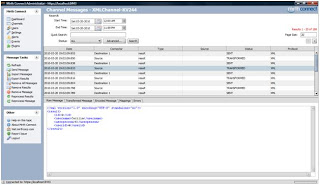Unbeknownst to myself, in a previous job I wrote an interface engine. It was a (initially) simple VB application which was reading files from a directory and copying them to another directory, then deleting them from the source. Then more source directories were added. Then, file endings had to determine the destination. Then, file contents (i.e., header or template-based triggers) had to determine which files were copied and which not. Finally, database tables became source/destinations. The thing had grown immensely since the beginning and it was running 24/7, with a 30 second polling interval, and a large number of customers were relying in fact on a rickety PC running a hopelessly spaghetti-coded application with manually-installed DLLs. If only they knew.
I did not know at the time that this was an interface engine. Somewhat restricted to healthcare and financial IT, one wonders why this concept hasn't taken off in mainstream computing more significantly. I.e., in databases, interfaces could provide a strong and pervasive (cross-platform, even) replication/synchronization mechanism.
Or perhaps the concept has been folded into workflow engines and transaction-based orchestration systems; Biztalk or Oracle Fusion can presumably do what interface engines do, and much more – but at a hefty footprint.
Mirthcorp's Java-based interface engine, below, running against a Cache database over JDBC/ODBC.
Message passing:
Channel definition:
A web-based interface engine? Perhaps using technology similar to YQL. Monitoring a queue of some kind and updating your Facebook status? Have to think about this one.


